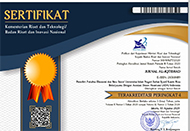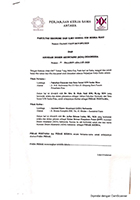HALAL TOURISM AND SERVICE EXCELLENCE: KEY DRIVERS OF TOURIST SATISFACTION IN TANJUNG PINANG
Abstract
Keywords
Full Text:
PDFReferences
Alquran dan Hadits
Ab. Wahab, N., & Kamarubahrin, A. F. (2019). Halal Industry: Are The Businesses Fully Awake? Journal of Fatwa Management and Research, 21–35. https://doi.org/10.33102/jfatwa.vol16no1.216
Ali, F., Amin, M., & Cobanoglu, C. (2016). An integrated model of service experience, emotions, satisfaction, and price acceptance: An empirical analysis in the Chinese hospitality industry. Journal of Hospitality Marketing & Management, 25(4), 449-475.
Battour, M., & Ismail, M. N. (2016). Halal tourism: Concepts, practises, challenges and future. Tourism Management Perspectives, 19, 150-154.
Bohari, A. M., Cheng, W. H., & Fuad, N. 2013. An Analysis on the Competitiveness of Halal Food Industry in Malaysia: An Approach of SWOT and ICT Strategy. Malaysia Journal of Society and Space, 9 (1)
Buhalis, D, & Cooper,C, 1998, Small and medium sized tourism enterprises st the detinssiun, Embrancing and managing change in tourism: internasional ase stidies, 393
Gillani, S. H., Ijaz, F., & Khan, M. M. 2016. Role of Islamic Financial Institutions in Promotion of Pakistan Halal Food Industry. Islamic Banking and Finance Review, 3 (1)
Haryeni, H., & Yendra, N. (2024). Dampak Halal Certification, Dan Destination Brand Terhadap Behavioural Intention: Efek Mediasi Tourist Satisfaction. Jurnal Ekonomika Dan Bisnis, 4(4), Article 4. https://doi.org/10.47233/jebs.v4i2.1839
Jaelani A. (2017). Halal tourism industry in Indonesia: Potential and prospects.Working Paper Maret 2017. https://mpra.ub.uni-muenchen.de/76237/
Kovjanic G. 2014. Islamic Tourism as a Factor of the Middle East. Turizam. 18 (1)
Kotler, Philip. (2007). Manajemen Pemasaran, Analisis Perencanaan. Pengendalian, Prentice Hall, Edisi Bahasa Indonesia, Jakarta. : PT. Salemba Empat.
Lalu Adi Permadi dkk., “Persepsi Dan Sikap Masyarakat Terhadap Rencana Dikembangkannya Wisata Syariah (Halal Tourism) Di Provinsi Nusa Tenggara Barat,” AMWALUNA 2, no. 1 (31 Januari 2018): 39, https://doi.org/10.29313/amwaluna.v2i1.3275.g2151.
Munirah L, Ismail H, 2012, Muslim Tourists‟ Typologi in Malaysia: Perspectives and Challenges. Proceedings of the Tourism and Hospitality International Conference. Malaysia: Department of Urban and Regional Planning, Faculty of Built Environment.
Pratiwi, Ade E. 2016. Analisis Pasar Wisata Syariah di Kota Yogyakarta. Jurnal
Puguh Suharso. (2009). Metode Penelitian Kuantitatif untuk Bisnis: Pendekatan Filosofi dan Praktis. Jakarta: PT Indexs.
Purbawisesa, dan Gusti Adi. (2014). Citra Destinasi Wisata daerah istimewa Yogyakarta dalam persepsi wisatawan nusantara dan penduduk lokal. Jurnal Universitas Sanata Dharma Yogyakarta.
Putra, E. H., Hati, S. R. H., & Daryanti, S. (2016). Understanding Muslim Customer Satisfaction with Halal Destinations: The Effects of Traditional and Islamic Values. European Proceedings of Social and Behavioural Sciences, Business&Economics-BE-ci 2016. https://doi.org/10.15405/epsbs.2016.11.02.16
Qardhawi, M. Y, 1993, Halal dan Haram dalam Islam, PT. Bina Ilmu
Rahmatulloh, M. S. (2021). Pengembangan Destinasi Wisata Halal (Halal Tourism) dalam Meningkatkan Kesejahteraan Masyarakat. Anida (Aktualisasi Nuansa Ilmu Dakwah), 21(2), Article 2. https://doi.org/10.15575/anida.v21i2.16185
Riyanto Sofyan, 2013. Prospek Bisnis Pariwisata Syariah. Jakarta. Buku Republika Indrawan, Rully dan Poppy Yuniawati. (2014). Metodelogi Penelitian, Bandung. Refika Aditama.
Riduwan. (2004). Metode dan Tekhnik Penulisan Tesis. Bandung: Alfabeta.
Riyanto Sofyan. (2013). Bisnis Ekonomi Syariah Mengapa Tidak. Jakarta: PT. Gramedia Utama.
Razzaq, S., Hall, C. M., & Prayag, G. (2016). The capacity of New Zealand to accommodate the halal tourism market–or not. Tourism Management Perspectives, 18, 92-97.
Santoso. S. (2000). Buku Latihan SPSS Statistik Paramatik. Jakarta: Alex Media Komputindo Gramedia.
Saputri, R., Maszudi, E., & Hamid, R. S. (2023). Islamic Tourism: Peran Islamic Facilities, Halal, Islamic Culture Dalam Menentukan Kepuasan Wisatawan. Jesya (Jurnal Ekonomi Dan Ekonomi Syariah), 6(2), Article 2. https://doi.org/10.36778/jesya.v6i2.1062
Suharyadi., & Purwanto, S.K. (2016). Statistik Untuk Ekonomi dan Keuangan Modern. Jakarta: Salemba Empat.
Wulandari, A., Marcelino, D., Baharta, E., & Taufiq, R. (2023). RELIGIUSITY MODERATED HALAL TOURISM AS THE ANTECEDENT OF TOURIST SATISFACTION IN BANDUNG. TRIKONOMIKA, 22(1), Article 1. https://doi.org/10.23969/trikonomika.v22i1.5070
DOI: http://dx.doi.org/10.24014/jiq.v20i2.34471
Refbacks
- There are currently no refbacks.















